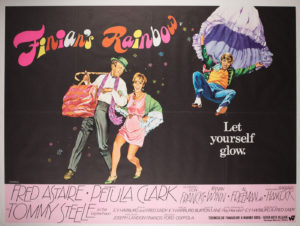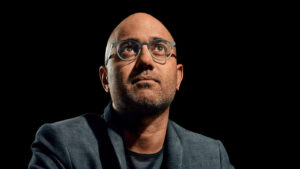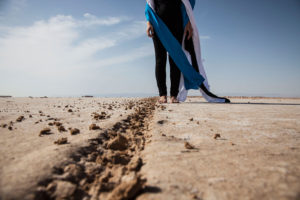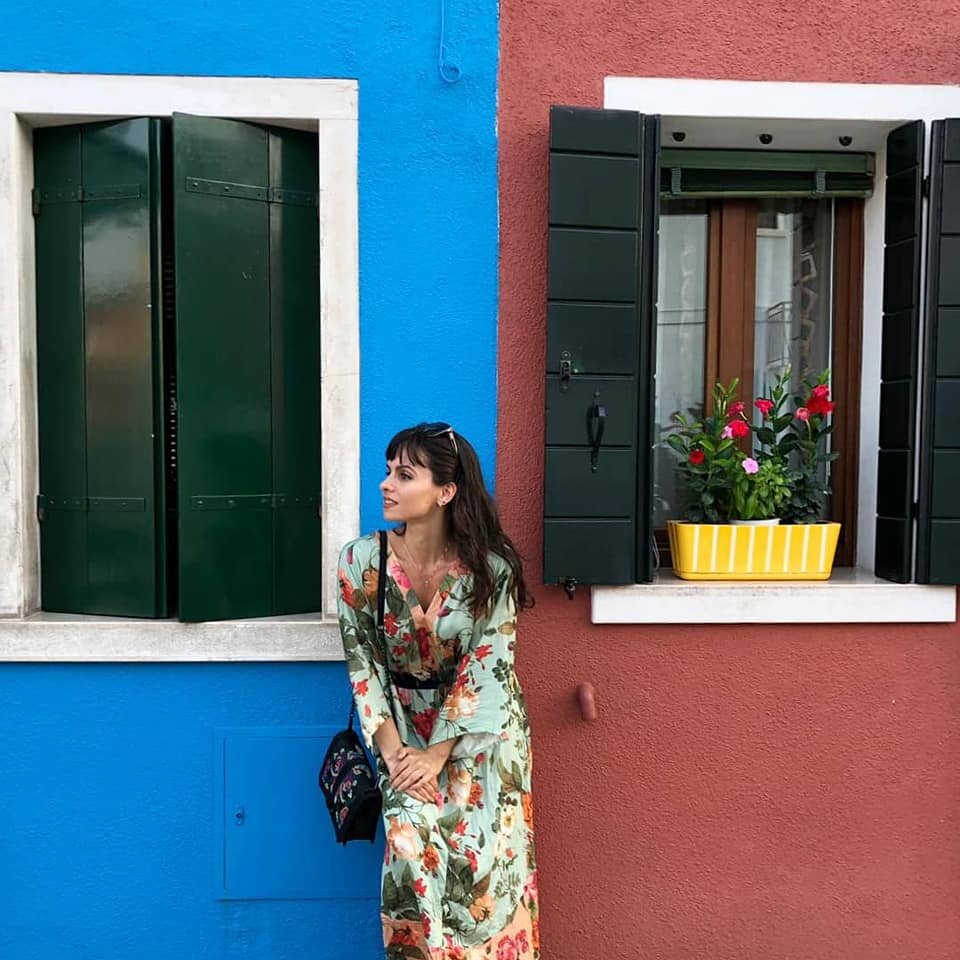 <
<
The writer in Italy (Photo courtesy Sarah Mills)
Sarah Mills
My maternal grandmother was the reason I began speaking in Arabic. I spent the first sixteen years of my life in Southern California before moving to Italy. School was in English, as was the greater part of my social life. I spoke in English with my father, who was born and bred in the Los Angeles area, his own Norwegian heritage present in traces, in an affinity for the Minnesota Vikings, on old Americanization certificates and monochrome photographs of boys in knickerbockers and women in wide-brimmed, flower-festooned hats, on postcards and Christmas cards from the 1940s, wishing relatives a ‘God Jul!‘ There was little of my European ancestry in our house, only in stories of tobacco fields in Greece, of distant relatives in Germany and Lillehammer.
There is nothing moth-eaten or far-removed, however, about the other half of my identity, that which is unequivocally Arab. My mother’s Lebanese contribution to my patchwork dominates, its colors bold and conspicuous, in contrast with the more muted shades of a heritage I did not feel fully connected to, that, while dear to me, was always several degrees removed. Lebanon, by comparison, was immediate and pervasive in the way it came to take up space within me, and as I grew older, I knew that I wanted to bridge every gap that distanced me from it, beginning with the language gap that prevented my grandmother and I from communicating as fluidly as I would have liked. It was thus that I forced myself to string together what little Arabic I had picked up over the years and use it in speaking with her.
Teta was the tether to my ultimate sense of continuity. As life shifted around me, as I left one country for another, exchanged childhood for adolescence and then for adulthood, as friendships dissolved and others formed, she remained a constant, reminding me that I came from somewhere. She was born in Beirut, shortly after the creation of the State of Greater Lebanon. She lived through the Battle of Beirut in 1941, the 1958 crisis, the Civil War. She had wanted to study English, but the will of her male relatives prevailed, and she pursued a different path instead, becoming a formidable seamstress.
She had always visited us in California, where my parents met. My fondest childhood memories involve her, my mother and my aunt (who also came from Lebanon to live with us) making tabouleh, stuffed zucchini and grape leaves, as I listened in on their easy chatter, picking up fragments of Arabic, absorbing it into my skin, forever associating it with that warm kitchen glow. In car rides to and from school, cassettes played Fairuz, Umm Kalthum, Cheb Mami, Khaled, Amr Diab, Kadim Al Sahir, reinforcing my love for the language and, by extension, the region that spoke its many, varied dialects, shaping my interests for the future: I would become fascinated with, and deeply troubled by, that part of the world, which contained such vast richness and had contributed so profoundly to the entire human legacy, but which was plagued by devastating, relentless conflict.
When my family and I moved to Italy, Teta’s airplane trips became mercifully shorter, and she visited us even more often. She was an unfailing smile, a collection of stories about relatives and places in Lebanon that she infused with familiarity even though they were unknown to me. She always brought gifts for us in her luggage: coffee with cardamom, khubz markouk, zaatar, baklava. We played cards together. I was named for her.
“Home is not where you were born; home is where all your attempts to escape cease.”
I measure my life before and after her. Naguib Mahfouz famously said, “Home is not where you were born; home is where all your attempts to escape cease.” Before her passing in 2017, home was the size of her luggage, the sound it made when it rolled through our door, the smell it gave off when we opened it. Afterward, a wide chasm yawned where my sense of security once was, and I found myself displaced. I left the small Italian town I had moved to, where I felt things came to stagnate and where most everyone seemed to know each other and only know me in virtue of my otherness, imagining that my unease was owing all to the fact that I hadn’t assimilated. Italy was, is, beautiful, but no roots had formed to hold me in place to its soil. I understood and spoke the language, but I stood on its sidelines in conversations. Its traditions, its fixed mealtimes and schedules, its multigenerational families, its deep familiarity and ease with itself all felt like supreme self-assuredness to my insecurity — almost an insult. In a country with such a strong cultural identity, my mixed heritage and my foreignness seemed like a disadvantage.
California loomed, offering, if nothing else, another escape in search of an elusive idea of home I mistakenly thought I could run away to, rather than create for myself. It was when I stood outside my childhood house, a new color of paint on its panels, a new family inside, that I realized I would never be able to walk up to its front door and find myself back in time. The landmarks of my old city were all the same, more or less, but the people I loved most were a continent away. There was nothing keeping me in California, either. I had come full circle, and the poetic irony of that was not lost on me. It had been a necessary journey, nevertheless. If I had not made so many attempts at escape, I might never have understood Mahfouz. I found myself back in Italy one very ordinary day, wondering, with new eyes, how it was that I could have ever wanted to leave its inviting trattorie, its cobblestones, its stone pines, its sunset swarms of starlings, the monuments that never failed to slow my steps as I passed them, as striking as they were the first time I laid eyes on them. And yet, despite all these epiphanies, one thing would remain unchanged: my sense of home is still firmly rooted in a part of my identity that is indeed associated with a place — Lebanon.
I carry Lebanon around in my heart like a secret. Little about me gives it away. Lebanese mothers cannot confer citizenship to their children. My last name is my father’s and his father’s, the Anglicized product of US border control, which stripped away the Norwegian from it as it stripped away the distinguishing, ethnic character of countless immigrant surnames, homogenizing them into the great melting pot. My features are ambiguous; I am white-passing. Where are you from? I make them guess. I’ve so far been told I am Argentinian, French, Moldovan, Greek (they got that last one right; I’m an eighth Greek on my dad’s side). It is only when I say what I am that people say, Ah, yes, I see it now, definitely. Western men have fetishized me for it on more than one occasion, and I almost want to revert to the effacing I’m American. Almost. That I can hide or take out my Arabness at will has sheltered me from the worst of racism, though post-9/11 school bullies made me squirm in my seat when they ululated or cracked jokes about Allah, a word that featured so frequently in conversations at home, a word that my grandmother so often pronounced. Allah yehmiki, Subhanallah, Masha’allah, Allah yerhamo.
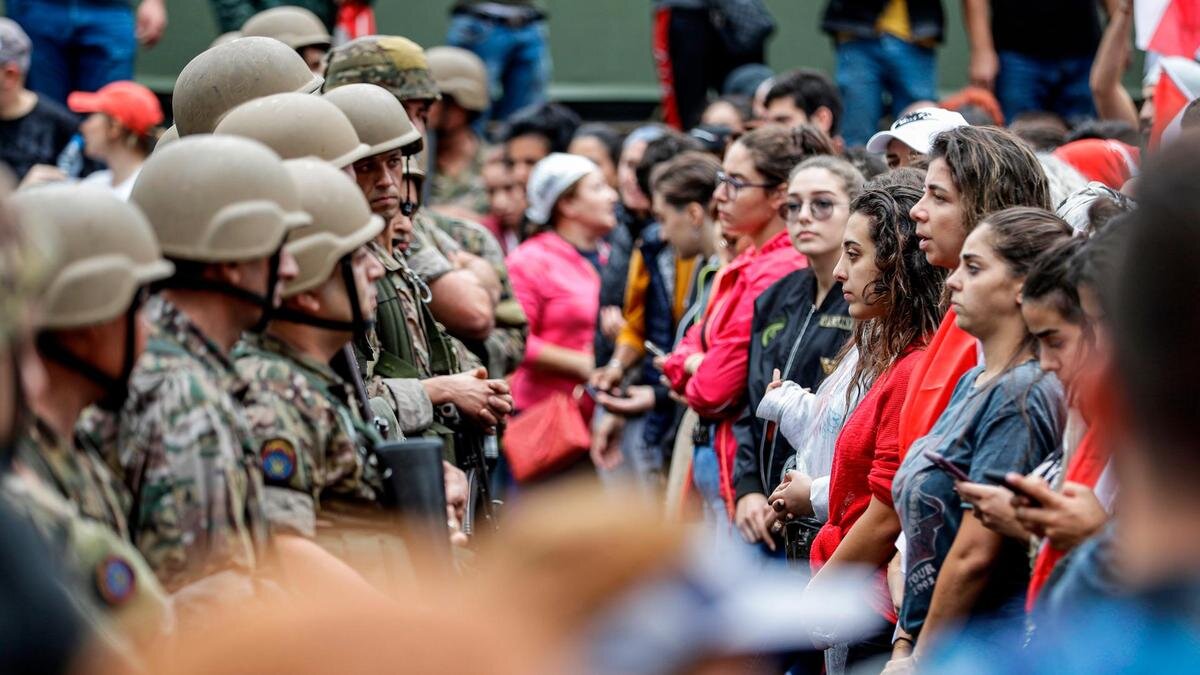 <
<
Women form the first line of defense in Lebanon’s revolutionary protests late last year
Do I Have a Choice?
I am Arab in every way that matters — in the humor I respond to, in the food that reminds me of unconditional love, in the music that recalls stepping into Arab-owned shops in Southern California for majdouli cheese and halva, in the subjects that inspire the bulk of my writing, in the way I relate to writers from the across the Middle East, in the history that is mine, that scattered my relatives across the world, where they alternate between relief at not living in Lebanon anymore and painful nostalgia for the same reason. I am Lebanese in the joy and hope I felt at seeing the October protests; in the immeasurable grief I felt in seeing empty fridges, in learning of the new exodus of people who would also end up in an ever-growing diaspora, forced to choose between staying in their homeland or feeding their families; in the deep regret I felt to hear of the groves and orchards my family in Lebanon sold. That land is our old world, made just a little bit smaller, one more lifeline tying us to it snapped. With the explosion of the port of Beirut, the pandemic, the economic crisis, that world has shrunk to one close relative in Beirut and our phone calls with him, punctuated by sighs and always ending on the same note. Yalla, when all this is over with, we are waiting for you, we tell him. But I always imagine myself buying a ticket for Lebanon first, returning to our garden with the persimmon and pomegranate trees, our old stone fountain where my mother and her siblings cooled watermelons under its stream during the hot summers.
Despite the inextricable Arab part of my whole, I feel sometimes as though I can hardly lay claim to being Arab at all. I can only get by in broken Levantine dialect. I can barely read or write in Arabic. I would never know it as someone who was born and raised there, as social media jokes about diaspora kids often reminded me — jokes that almost always belied some resentment, as though those of us in the diaspora were guilty of having abandoned our countries of origin, as though we were less worthy of a title designating us Lebanese. When I am in Lebanon, I am the American cousin, niece, friend. In just a couple of years, I will have lived in Italy as long as I did in California, but I feel neither Italian nor Californian, and when I am asked how far Woodland Hills is from Thousand Oaks or from Santa Monica, I really can’t say. But I do understand the distinct dialect of a small, mountainous town in central Italy, and I can distinguish between the accents of Rome, Milan, and Naples.
Much has been written on identity; it would seem that a crisis related to it is latent in all of us. There is something about being “so far from tribe and fire,” to borrow a phrase from Danusha Laméris, that predisposes a person of mixed heritage, who has known many homes and none at all, to experience that crisis in an immediate and acute way. When most everyone clings to some marker of identity or another, what does it mean for someone of mixed heritage when adopting these markers feels disingenuous, when favoring one over the other seems arbitrary to observers, when others who share that marker with her do not see her as one of them? I have spent too much time agonizing over these questions and perhaps will do so yet again, whenever I have to ask someone to slow down or repeat something he or she has said in a language I feel I should have mastered by now and ought to hardly have an accent in anymore.
Amin Maalouf wrote: “Identity cannot be compartmentalized. It cannot be split into halves or thirds, nor have any clearly defined set of boundaries. I do not have several identities, I only have one, made of all the elements that have shaped its unique proportions.” Revisiting this has led me to wonder whether crises of identity are not the product of our own attempts to reduce our world, to whittle it down into a perfect paradigm of what we think ‘authentic’ should be, so we can represent it, reflect it in some pure, distilled form. But how is that different than projecting our most stereotyped idea of it? To claim and assert identity, we must be able to acknowledge its multiplicity, its messiness, its fluidity, the sum of the experiences that have molded it into its current form, always subject to evolve but no less grounded in objective, shared reality. A child of the world is a bridge between its islands, and I have chosen to see myself as such rather than as an incomplete version of any one part of the aggregate.
In a world with porous borders, in which the languages we speak, the food we eat, the clothes we wear, the technology we use all have shared origins, why not celebrate our mosaic identities without castigating ourselves as imposters?
“I am the hyphen, the distance between Lebanese and American,” I wrote in a poem (“Ink & Oil” 2019). Although I once placed much of the blame on that hyphen for the feelings of homelessness I have written about here, I now see an abundance of potential therein — potential to construct meaning, to reconcile one side of that hyphen to the other. This essay is, in large part, a tribute to one of the most influential people in my life, the woman who helped shape my character into what it is today. But it is also an ode to the mosaic identity — to imperfect accents, to fusion dinner spreads, to heterogenous origins, to borrowing expressions from different languages to suit specific contexts, to poetry verses in both Arabic and English, to sitting in quiet contemplation of communities that we might never fully blend into, but also to the defiant assertion of our right to a place at the table where all things concerning our identity are discussed. “Write down! I am an Arab,” wrote Mahmoud Darwish, channeling his fury at the military law and bureaucracy that had come to dominate every aspect of Palestinian life when he was growing up. When so much of what defines the Arab experience in modern history — and the literature inspired from it — has been displacement, eviction, the search for a new home and a longing for the old one, a reckoning with identity is woven into the very fabric of that experience. This is my humble contribution to that tradition.
<pdata-rte-preserve-empty=”true” >
<



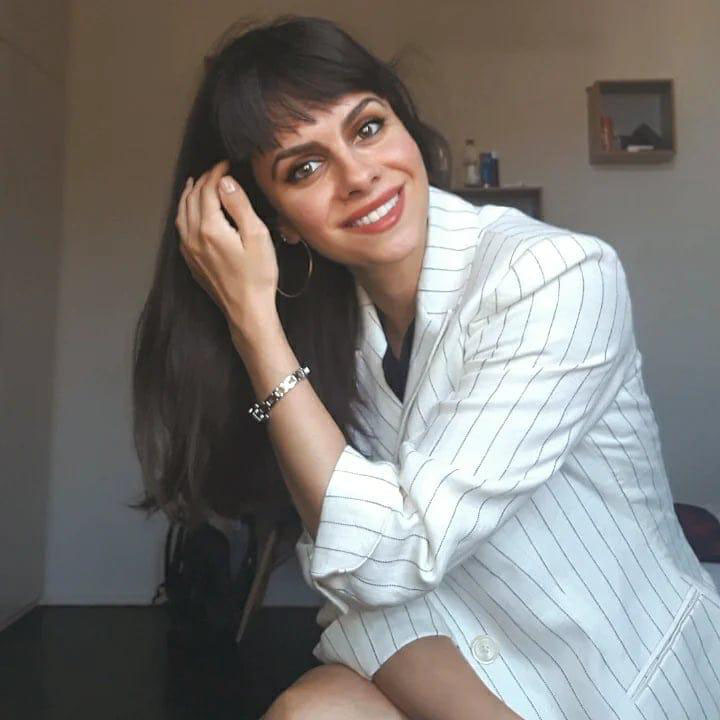







![Ali Cherri’s show at Marseille’s [mac] Is Watching You](https://themarkaz.org/wp-content/uploads/2025/09/Ali-Cherri-22Les-Veilleurs22-at-the-mac-Musee-dart-contemporain-de-Marseille-photo-Gregoire-Edouard-Ville-de-Marseille-300x200.jpg)







































































































